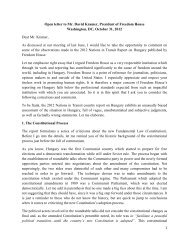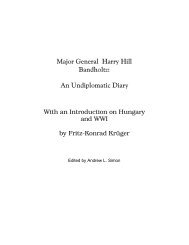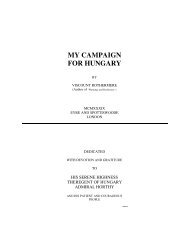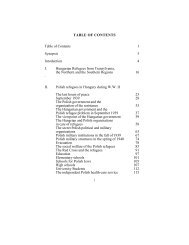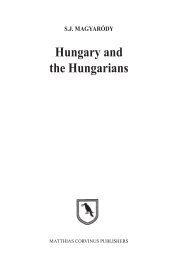The Fate of Western Hungary 1918-1921 - Corvinus Library ...
The Fate of Western Hungary 1918-1921 - Corvinus Library ...
The Fate of Western Hungary 1918-1921 - Corvinus Library ...
Create successful ePaper yourself
Turn your PDF publications into a flip-book with our unique Google optimized e-Paper software.
Nádasdy Battalion <strong>of</strong> hussars <strong>of</strong> Sopron. As well, southeast <strong>of</strong> the village, a<br />
telephone-eavesdropping / tapping device, the invention <strong>of</strong> Elek Schrantz,<br />
cinema owner <strong>of</strong> Alsólendva, was set up on top <strong>of</strong> one <strong>of</strong> the hills. Through it,<br />
important information was collected from the Serb forces’ calls, mainly in<br />
French. 146<br />
As these events were happening, the Károlyi government, at its December<br />
12, <strong>1918</strong> session, named Béla Obál 147 as Commissioner for Vend Affairs, who<br />
was also the High Constable <strong>of</strong> Vas County. In early January, Obál brought<br />
forth his plan to create a separate Vend county, as part <strong>of</strong> the autonomy to be<br />
granted to the minorities <strong>of</strong> <strong>Hungary</strong>. <strong>The</strong> Vends (Slovenes) were to be part <strong>of</strong> a<br />
new administrative department. <strong>The</strong> new county was to be made up <strong>of</strong> the<br />
southern Vas County districts <strong>of</strong> Felsőlendva and Muraszombat, plus a new one<br />
in Zala County, to be called Belatinci [Slovene: Beltici] district. <strong>The</strong> proposal<br />
did not gain favor because a portion <strong>of</strong> the Slovenes wished to be joined to the<br />
new South Slav country.<br />
At the same time, József (Jožef) Klekl, retired parish priest <strong>of</strong> Cserencsóci<br />
(Črenšovci), with the assistance <strong>of</strong> four <strong>of</strong> his Vend-leaning Catholic priest<br />
associates, worked out their own proposed autonomy, aimed at uniting all the<br />
Slovenes living along the Mura and Raba Rivers. It was to be an independent<br />
administrative unit called Slovenska krajina (Slovene region), centered on<br />
Muraszombat (Murska Sobota). This independent territory was to be under the<br />
administrative control <strong>of</strong> <strong>Hungary</strong>, or, as dictated by events, the Kingdom <strong>of</strong><br />
Serbs-Croats-Slovenes. <strong>The</strong> proposal included in the krajina villages lying on<br />
the Slovene-Hungarian language border and decisively Hungarian populated,<br />
the Slovene population making up only a few percent, among them the two<br />
district seats <strong>of</strong> Alsólendva and Szentgotthárd (these two with a Slovene<br />
population <strong>of</strong> 283 and 85, respectively).<br />
Beside the Obál and Klekl proposals, there was another one, created by<br />
Vilmos Tkálecz, assistant ethnic commissioner and former choir-master <strong>of</strong><br />
Cserencsóci, and his associates regarding autonomy <strong>of</strong> the Vend region. At<br />
Obál’s request, prime minister Dénes Berinkey invited the representatives <strong>of</strong><br />
the three proposals dealing with the Vend region autonomy to a conference in<br />
Budapest on February 12, 1919. 148 <strong>The</strong> plans for the autonomous region,<br />
received with unexpected indifference by the public, were swept away by the<br />
events <strong>of</strong> the following weeks and months.<br />
In the first week <strong>of</strong> February, János Mikes, 149 Roman Catholic bishop <strong>of</strong><br />
146 Göncz, op. cit., pp. 39, 51.<br />
147 Béla Obál (1881–1952), born in Vashidegkút, novelist, newspaper reporter, taught<br />
Church history in Eperjes (Prešov) between 1907-<strong>1918</strong> at the Evangelical <strong>The</strong>ological<br />
Academy. After the change <strong>of</strong> governments, he returned to Vas County. Of the<br />
activities <strong>of</strong> ‘Comrade Obál’ in the Hungarian Socialist Republic, see the forgotten<br />
memoir by Éhen, Gyula: A felfordult ország [Country in turmoil]. In: Vasi Szemle,<br />
1995, issue 1, pp. 128–129.<br />
148 Göncz, op. cit., pp. 43–49.<br />
149 Count János Mikes, born in the Transylvanian village <strong>of</strong> Zabola in 1876. He was<br />
64




